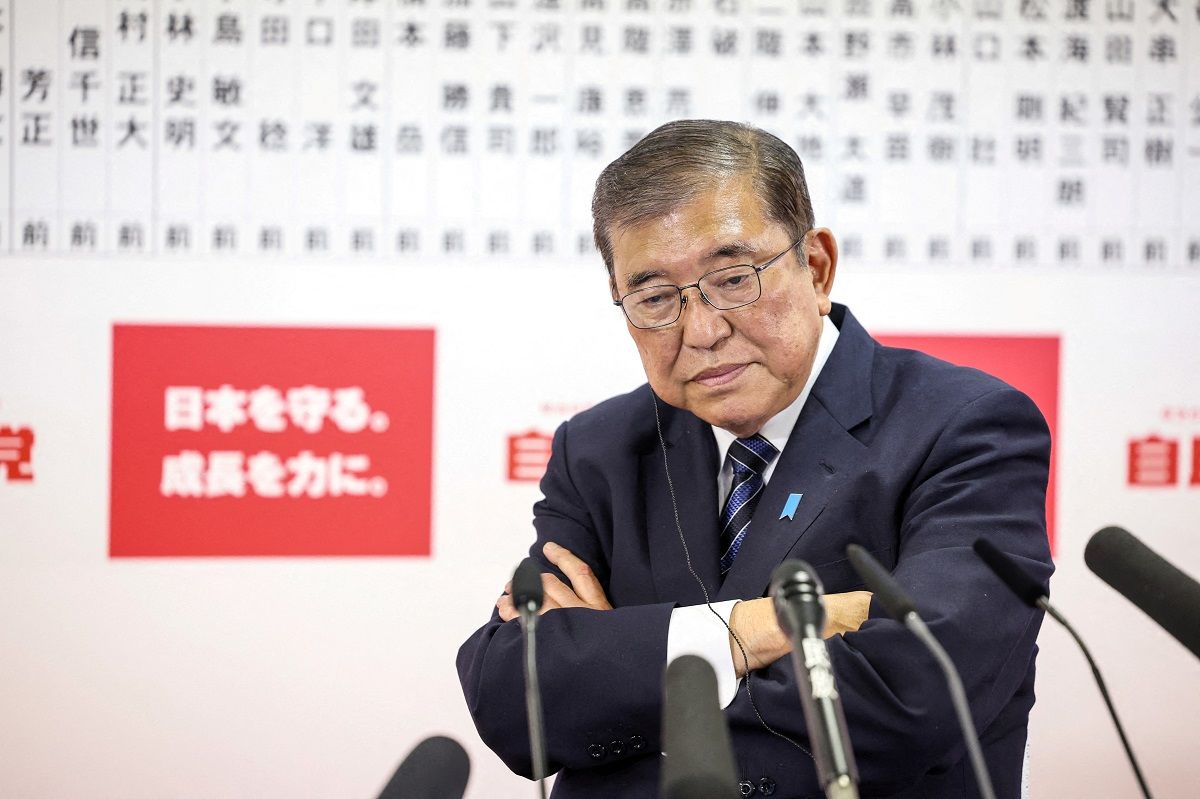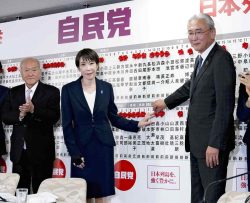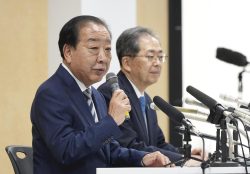Japan Election: Ishiba Faces Calls to Step Down from Premiership; LDP Could Stay in Power Through ‘Partial Coalition’

Japan’s Prime Minister Shigeru Ishiba speaks to the media at the Liberal Democratic Party’s (LDP) headquarters on October 27, 2024 in Tokyo, Japan.
16:06 JST, October 28, 2024
Some have begun calling for Prime Minister Shigeru Ishiba to resign after the Liberal Democratic Party and Komeito failed to secure a majority of seats in the House of Representatives election on Sunday.
If the LDP forms a minority government even after joining up with unaffiliated lawmakers, the party apparently intends to maintain the administration by cooperating with parties such as the Democratic Party for the People on a policy-by-policy basis. However, talks with the opposition could prove difficult.
Hoping to ride the momentum from his LDP presidential race win in September and the launch of his Cabinet, Ishiba dissolved the lower house eight days after assuming the premiership and held the snap election 26 days after taking office. Both acts were postwar records for speed, but they failed to give him the election results he had hoped for.
The loss was largely driven by voter resentment and strong distrust toward the LDP over recent violations of the Political Funds Control Law involving party factions. Though the LDP chose not to endorse some scandal-tainted members, in the final stage of the campaign it was revealed that the party’s headquarters had provided ¥20 million even to branches headed by candidates without official party endorsement. This sparked further criticism.
“The people have expressed a strong desire for the LDP to reflect more on its actions,” Ishiba, who also serves as LDP president, said during an NHK program on Sunday. “If we don’t change [the party] sufficiently, it will come under severe criticism again in the House of Councillors election.”
As Ishiba had set securing a majority for the ruling bloc as the baseline for victory, a mid-ranking LDP upper house member suggested there could be resignations from LDP Secretary General Hiroshi Moriyama and Shinjiro Koizumi, chairperson of the party’s Election Strategy Committee. The member added, “The prime minister has a serious responsibility to bear, and it will be difficult for him to stay in office.”
Going forward, the opposition is likely to hold the upper hand in the Diet, while the ruling bloc will likely be forced to walk a tightrope.
The LDP leadership intends to work together with the DPFP and the Japan Innovation Party on individual policies, according to sources. Coordination between the parties is expected to take time, but the LDP is likely to try whatever it can to avoid having the opposition parties unite around the Constitutional Democratic Party of Japan.
In the 1993 lower house election, the LDP, led by then Prime Minister Kiichi Miyazawa, failed to win a majority, while the opposition Japan Renewal Party and Japan New Party made major inroads. Through coalition talks after the election, the non-LDP-aligned forces led by Morihiro Hosokawa, then leader of the Japan New Party, launched a new cabinet.
Top Articles in Politics
-

Japan PM Takaichi’s Cabinet Resigns en Masse
-

Sanae Takaichi Elected Prime Minister of Japan; Keeps All Cabinet Appointees from Previous Term
-

Japan’s Govt to Submit Road Map for Growth Strategy in March, PM Takaichi to Announce in Upcoming Policy Speech
-

LDP Wins Historic Landslide Victory
-

LDP Wins Landslide Victory, Secures Single-party Majority; Ruling Coalition with JIP Poised to Secure Over 300 seats (UPDATE 1)
JN ACCESS RANKING
-

Japan PM Takaichi’s Cabinet Resigns en Masse
-

Japan Institute to Use Domestic Commercial Optical Lattice Clock to Set Japan Standard Time
-

Israeli Ambassador to Japan Speaks about Japan’s Role in the Reconstruction of Gaza
-

Man Infected with Measles Reportedly Dined at Restaurant in Tokyo Station
-

Videos Plagiarized, Reposted with False Subtitles Claiming ‘Ryukyu Belongs to China’; Anti-China False Information Also Posted in Japan





















